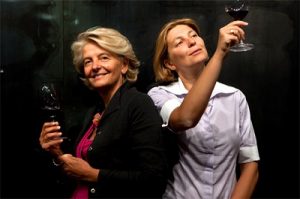Name: Chiara Lungarotti (right)
Country: Italy

Currently: General Manager at Lungarotti Estate
Website: www.lungarotti.it
Questions:
Please, tell us about how you got into wine, the wine industry and how your career developed?
I grew up with the passion for winemaking since I was a little child, when my father would bring me walking among the vineyards in bare feet, as he said it was the only way to “learn” to feel the soil. I always breathed the bouquet of the must and of the red wine aging in the big oak casks while playing in the winery… Ever since I was a little child, I knew that my future would have been in wine: it was the passion I wanted to pursue in my life.
At University, I studied agronomy with a specialization in viticulture
then I started my working experience in our family Estate in 1992: I was still a student but I was fascinated by experiencing directly on the field what I was learning in the textbooks.
What is your philosophy to making wine and viticulture?
I strongly believe that a wine has to be the expression of the territory it comes from and that a good winemaker is the one who manages to optimize all the production factors at his/her disposal in the best way: the soil, the weather of a vintage (the greater the difficulty of a vintage –either in case of too much rain or, on the contrary, the case of drought-, the greater is the influence on the final result of the work done by the winemaker in the vineyard) and, finally, the varietal.
All of this contributes to producing a unique wine!
Wine is made in the vineyard, with a series of decisions that are based on the concept of respecting the land: if you are strict and demanding both towards yourself and towards the vine, both the vine and the land will reward your commitment. The attention must never wane, and there must be a perfect harmony between the agronomic part and the enological part of wine production.
Since the winter pruning it must be clear what the final result must be, which characteristics the final wine will present in terms of quality, character, territory and uniqueness.
Which cultivar is your favourite to work with and why?
Sangiovese. This is the varietal that I grew up with, the most widely cultivated in Umbria and in central Italy in general, and the varietal which I have focused on in my research, both in the vineyards and in the cellars. This is a varietal that, with the correct agronomical choices, can produce great wines, both in blends and in 100% Sangiovese wines. If one prefers, however, it can also produce fragrant and light wines: everything depends on how the vineyard is cultivated and therefore, of course, on the yield per plant.
How do you see the future of wine production and what are the challenges and the opportunities?
Looking to the future under a production point of view we have to think about a great problem, as the global warming and the consequent climate change. We are aware of this challenge: we cannot remain indifferent in the face of it, nor can we passively accept the negative consequences of this climate trend. In our Estate we have developed an experimental vineyard with experimental varietals already at the beginnings of 2000s; this has allowed us to evaluate our possibilities of reaching the desired objective, also thanks to a careful consideration of climatic parameters. I would like to give an example: for our white wine Torre di Giano, after lengthy experimentation, we have decided to substitute part of the Trebbiano content with Vermentino. This varietal maintains a perfect balance and acidity even in very hot climate and gives fragrant characteristics that allow this wine to maintain its typical freshness without its character being greatly modified.
Where do you see the global wine market in 2025?
For millennia wine has been a much-loved and sought-after beverage, present in the daily life and in the imagery of the various Mediterranean cultures -in our Wine Museum one can find infinite examples of this (www.lungarotti.it)- and I think that it will continue to be a very important element of life in western/European countries and, at the same time, more and more curiosity will grow around it for this reason in “far” countries and cultures.
The fine wine market will be increasingly “stressed” by the greater knowledge on the part of consumers, who will look more and more for UNIQUE wines, where the uniqueness is given by the sensitivity with which the winemaker interprets his/her terroir and the characteristics of the vintage. For this reason, if it becomes necessary, we must even become drastic. In this day and age, the choice of “quality, not quantity” is always more valued; this translates into making choices rather than passive behavior. It is necessary to let consumers know about the uniqueness of one’s terroir by adequately informing consumers about one’s own territory. And here, I am speaking about Umbria, the region in which I live and work, that maintains its characteristics of great balance and harmony in its wine production. Anyway above all, it is necessary to educate consumers to enjoy wine with moderation and to select quality products. It is important to taste, not simply to drink.
Chiara Lungarotti
@ by Dominik Kozlik – Zeitgeist Sommeliers – International Sommelier Positions – www.sommelier-jobs.com

Dominik Kozlik e.U.
Gruberstraße 78/12
4020 Linz, Österreich